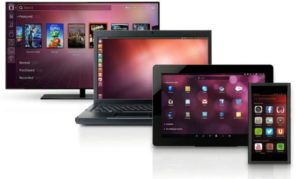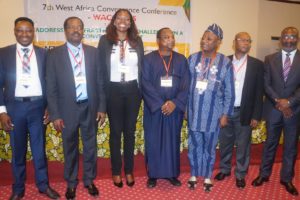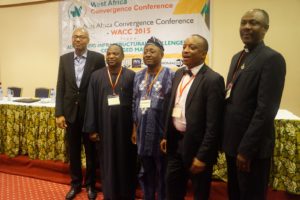Since the internet became part and parcel of our existence and communication became more than a piece of telephone box, everything at home and the workplace has changed. Technology convergence has opened new frontiers for social and business engagements. Banks have gone into the mobile phone and schools have become web based platforms. There are more! Countless possibilities and increasing numbers of once unfathomable vistas that have changed the way we live and the way global economy operates. Just one window may serve as your broadcast receiver, your World Wide Web platform, your ecommerce place and your everything. In the age of internet of everything (IoE), there are no more definable walls or limits; there are just connecting pipes, platforms, contents, people, innovations, and the ubiquitous regulators grappling with thinning lines of once separate technologies as convergence take firmer foothold.
As participants at the 7th West Africa Convergence Conference that held in Lagos recently noted, convergence poses challenges to regulators but most importantly, it alters the market dynamics. Also, it is the singular pivotal factor determining the future of multiple sectors. Disruptive technologies will continue to alter the status quo; how regulatory authorities and policy makers react to convergence will ultimately determine how slow or fast an economy joins the global train. Here’s one important take from infoDev:
“The ICT sector has undergone some dramatic changes in recent years, triggered by the development of new technologies and the convergence of existing ones, leading to a merging of markets and services. These developments affect traditional policy strategies, raising the question of how to deal with growing pressure to adopt converged regulatory regimes and how to successfully realize the potential of alternative network infrastructures. Over the past few decades these dramatic technological advances have coincided with a first wave of reform in developing countries, which has had a positive impact.
“However, this positive impact was largely accidental, resulting from a combination of internal and external pressures to open telecom markets and the transfer of GSM technology, which had achieved economies of scale from deployments in more mature markets. With digitization, all media become translatable into each other and escape from their traditional means of transmission: convergence relates to the merging of separate fields. What is primarily conceived of as convergence relates to technology, but in a secondary sense, a number of other fields come into play, including services, markets, related player configurations (industry alliances and mergers) and regulation (http://www.infodev.org/articles/technological-convergence-and-regulation)
Advocating converged ICT regulation option
Experts who gathered at this year’s West Africa Convergence Conference held in Lagos have called on the government to converge regulatory authorities in the communications industry in line with the current reality of IT convergence for accelerated economic growth and efficient management of reports.
One of the major issues for critical evaluation and discussion among stakeholders at this year’s edition of the West Africa Convergence Conference held in Lagos was the imperatives of effecting the harmonisation of the some critical regulators, overseeing different aspects of the nation’s Information and Communication Technology (ICT) industry.
The conference was to evaluate the current state of infrastructure challenges and how convergence could make the difference in terms of costs reduction, among other objectives.
Regulatory convergence
The forum, with the theme: “Addressing Infrastructural Challenges in a Converged market” turned out to be a gathering of stakeholders who frenetically stressed the need for a converged regulation in the ICT and related sectors, namely the telecoms, broadcasting and postal service.
As such, a merger is being advocated between two key agencies of the government, the Nigerian Communications Commission (NCC) and the National Broadcasting Commission (NBC), and possibly the National Information Technology Development Agency (NITDA) and Nigerian Postal Service (NIPOST).
According to the stakeholders, the world is increasingly experiencing a convergence of technologies, where the lines between telecoms and broadcasting regulations are becoming blurred by the day and where regulatory merger has become expedient for efficient resources management for accelerated economic growth.
“Today, the reality is that technologies are converging and the industry has also recommended the merger of NCC and NBC so as to ensure efficient utilisation of spectrum and other resources. This is one reality we cannot run away from,” said President Association of Telecoms Companies of Nigeria, Engr. Lanre Ajayi. He, however, said broadband development is key to driving convergence by getting policy and actions right to attract private sector investment in broadband infrastructure.
Executive Vice Chairman of the NCC, Prof Umar Danbatta, said, as the country, like other nations around the world witnesses technologies convergence, converging the regulators might also be a necessary condition to achieve much efficiency.
But the NBC Director-General, Mr. Emeka Mba, maintained that while broadcasting sector has a lot of benefit from the ongoing convergence, even as the country plans to achieve digital switch-over from analogue to digital broadcasting by 2017, “government policy on convergence is still cloudy.”Mba further explained that the issue of convergence should go beyond merging of agencies as such move also requires effective management of available resources to spur economic growth.
“What is most significant s how we see convergence. It cannot just be the issue of merging entities. The major issue has always been who controls the spectrum,” he said.
He, however, said the policy on whether to merge the agency should be “left to the new Minister of Communications, Barr. Adebayo Shittu and the new cabinet to decide,” saying it is beyond the regulatory agencies themselves.”
IT convergence
Chief Executive Officer, Knowhow Media International, promoters of the conference, Mr. Segun Oruame, in his address drove home the way convergence is shaping individuals world.
According to him, the future is convergence and that the need to take an action has come for the country.
“ICT convergence has become part of our daily lives. Convergence impacts on everything and everyone, There are no longer separate fields on how we use technology at home or in the workplace; inside fixed locations or while we are at the go.
“You cannot tell if the mobile phone can best be called a standard television screen. Telecoms operators and broadcast regulators must engage each other because the traditional broadcast media has long lost viewers to the new audience in converged media,” he explained.Consequently, in a communiqué issued at the end of the event, which chronicles key deliberations and recommendations, the participants numbering over 250, noted that the lack of industry convergence in the Nigerian ICT sector has resulted in fragmentation and inefficient management of resources.
Last-mile connectivity
Another area touched by stakeholders was the issue of data penetration, which is considerably low when compared with the 107 voice teledensity in the country.
According to them, growth in the data segment is said to be lagging far behind at less than 30 per cent and with broadband standing at just 10 per cent of the population compared to that of voice services where density is above 107 per cent. Nigeria has total active internet subscription of over 97.8 million currently.
They noted, however, that though a huge bandwidth capacity of over 9 terabyte per second landed at the shores of the country via four submarine cable operators, inter-city transmission has been a major issue.
Meanwhile, the Federal Government is promoting the rapid establishment of recovery agreements and the delivery of additional cable landing points to other coastal states in the country, even as it is also looking into ways to facilitate the distribution of the current landed fibre capacity of over 9Tb/s at the shores of Lagos to fast track last-mile penetration in the country.
Also, stakeholders said that the current targets by the government to have 3G/LTE Wireless Broadband coverage, as a minimum, to 80 per cent of the population, and fixed broadband based on fibre to at least 16 per cent of the population by 2018 is welcome, but stressed the need for political will to drive this target by the government.
As such, President, Medallion Communications, Mr. Ikechukwu Nnamani, said there was a need for stakeholders to come up with the incentives for stimulating broadband infrastructure rollout across the country by reducing import duties on devices, agree financials for infrastructure sharing.
According to the stakeholders, funding options for accelerating broadband infrastructure rollout must be stepped up and the need to have a framework for costing and pricing across board in the broadband implementation regime must be clearly marshalled.
Issues on ICT infrastructure, the need for state government to open up their states for faster infrastructure deployment to rip its economic benefits, need to drive local contents, government directive on getting its services online through Galaxy Backbone, the promotion of Nigerian cloud based services and necessary financial stimuli, as well as efforts being made NBC towards meeting the 2017 new date for digital switch-over (DSO) for the broadcasting industry also formed the crux of discuss
Also, the role a good policy on outsourcing can play in the provision of employment for the Nigerian youths and how satellite resources managed by the Nigerian Communication Satellite Limited (NIGCOMSAT) can complement the fibre to drive and improve broadband penetration in Nigeria, among others were also highlighted.
Place of local contents
In his contribution, the Nigeria Internet Registration Association (NIRA), Mr. Sunday Afolayan, underscored the importance of encouraging Nigerian local contents in the Internet convergence, where there is the peaceful/efficient coexistence of voice, data and video communication within the same network, the Internet.
“With this rate of convergence of the Internet of the world, local contents from all over the world are being rapidly uploaded and promoted. Nigerians need to join the world to upload our local contents to project Nigerian images online worldwide, advertising Nigerian culture, products, stories, etc. This will help in educating the world about Nigeria, Nigerian people, our culture, our rich and natural resources,” he said.
Going forward
After extensive discussions and with convergence technically and economically viable in Nigeria, the conference called for a harmonised regulatory platform for ICTs, telecoms and broadcasting even it recognised that regulations alone do not solve problems but the evolution of creative thought leadership.
Other recommendations center on the need for strategic efforts to ensure deeper penetration of ICT infrastructure, especially broadband access in the private and public sectors; calls for the government to consider merging regulator authorities as technology platforms converge and a need for the implementation of public enlightenment on the DSO project, among other.
Also, the participants also noted that for Nigeria to reach its projected growth by 2020, it must engage more of the opportunities in outsourcing, do more to ensure the continuous development of Nigerian contents on social media platforms.
“Every race, nation and communities must be able to decipher what is good for it without necessarily enslaving itself to the dictates of the West which seems to be current practice among the developing nations. There is no single culture or strategy that is perfectly adapted to economic growth and development. Each nation will have to figure out its path out of relative obscurity,” the communiqué issued at said.
Draft Communiqué of West Africa Convergence Conference – WACC 2015 held from 12th – 13th November 2015 at the Lagos Sheraton Hotel, Ikeja
- Background
The West Africa Convergence Conference – WACC Summit and Exhibition organized by the Knowhow Media International (KMI) took place at the Lagos Sheraton Hotel, Ikeja, Lagos State, Nigeria from Thursday, 12th to Friday, 13th November 2015. The theme of the conference was “Addressing Infrastructural Challenges in a Converged Market”. The programme started with a pre-conference dinner on Thursday, 12th November while the full business sessions took place on Friday, 13th November 2015.
- The Objectives were to:
- Evaluate the current state of infrastructure challenges and how convergence could make the difference in terms of costs reduction
- The progress and success of the current efforts to ensure bridging the infrastructure gaps;
- Plotting the requisite framework for deploying infrastructure across the various communities by indigenous expertise;
- Develop framework for creating critical employment opportunities skills enhancement through technical trainings;
- Examine funding platforms and articulating policy directions via public private coordination;
- Develop strategies for leveraging on technology transfer and encouraging the diaspora to be part of the resource base for filling the infrastructure gap.
- Come up with the appropriate strategies for the creation of a single regulatory institution in a converged milieu
- Opening Session:
Dignitaries at the opening ceremony were Engineer Greg Gbadamosi, Chairman WACC 2015, who presented the welcome address, Dr. Sola Afolabi, WACC 2015 Sessions Chair, who made WACC General Industry Remarks, and Engineer Lanre Ajayi, President Association of Telecommunications Companies of Nigeria (ATCON), who presented the industry stakeholders remarks.
Others included Professor Umar Garba Danbatta, the Executive Vice Chairman/Chief Executive Officer, Nigerian Communications Commission (NCC) who was represented by Deputy Director New Media (NCC), Mr. Emeka Mba, Director General/Chief Executive Officer, National Broadcasting Commission (NBC), Mr Peter Jack, Director General/Chief Executive Officer, National Information Technology Development Agency (NITDA), represented by Seyi Ogunseye of the National Office for Local Content on IT, Mallam Yusuf Kazaure, Managing Director/chief Executive Officer, Galaxy Backbone Limited who was represented by Franklyn Ginger-Eke, Head Stakeholders Management, Galaxy, Ms. Abimbola Alale, Managing Director/chief Executive Officer, Nigerian Communications Satellite (NigComSat), who was represented by Ibiye Memberr, Mr. Ikechukwu Nnamani, Managing Director/Chief Executive Officer, Medallion Communications Limited. Also present were Reverend Sunday Folayan, President Nigeria Internet Registration Association (NIRA), Mr. Shina Badaru, CEO Technology Times, Professor Samuel Zalanga, Department of Anthropology, Sociology and Reconciliation Studies, Bethel University, Saint Paul, USA, Dr Austin Nweze, President Association of Outsourcing Practitioners of Nigeria, Mr, Yele Okeremi, Group Managing Director/CEO, Precise Financial Systems, and Mr Olusoji Oyawoye, Managing Director/CEO, Resource Intermediaries Limited, who was represented by Shola Adekoya.
The chairman in his welcome address commended delegates for making out time to contribute to the conversation on convergence. He said that their contribution at the conference was going to be timely and priceless in giving critical inputs to government in its policy direction.
About 250 delegates who participated at the conference were drawn from across the Public and Private Sectors, Civil Society Groups, Students, the Academia and the Media. The speakers were experts drawn from various fields of Information Communications Technology (ICT) and beyond. There were Four Plenary sessions with a total number of 14 papers delivered. The sessions presented included Session 1: Convergence and Broadband Infrastructure, Session ll: Convergence, Digital Migration and Trends in the Broadcast Industry, Session lll: Convergence Trends and Local Content and Session lV: Convergence and BPO/Outsourcing – Opportunities and Challenges in Nigeria.
The Vote of thanks was presented by Dr. Sola Afolabi, Chairman, Baobab Think Limited & Qitech Technologies Limited.
- Observations
Following discussions at the Summit, Participants noted
- The the lack of industry convergence in the Nigerian ICT sector has resulted in fragmentation and inefficient management of resources
- Growth in the Data segment is lagging far behind (less than 30 per cent) and broadband even further behind (less than 10 per cent of the population) compared to that of Voice.
- There is however a huge bandwidth capacity of over 9Tb/s landed at the shores of the country via four (4) submarine cable operators – Glo-1, MTN-WASC, MainOne and SAT-3).
- The Federal Government is promoting the rapid establishment of recovery agreements and the delivery of additional cable landing points to other coastal states in the country, even as it is also looking into ways to facilitate the distribution of the current landed fibre capacity of over 9Tb/s at the shores of Lagos to fast track last mile penetration in the country.
- The Nigerian National Broadband Plan (2013-2018) which sets out a five-year roadmap and strategy, with focus on the primary objective of achieving a five-fold increase in broadband penetration in Nigeria by the year 2018 is not moving fast enough at the expected pace.
- The current plan targets to have 3G/LTE Wireless Broadband coverage, as a minimum, to 80 per cent of the population, and fixed broadband based on fibre to at least 16 per cent of the population by 2018.
- As at June, 2015, Nigeria has total active internet subscription of 97,815,572 out of an estimated population of about 140million (2006 official census figure).
- Stakeholders need to come up with the incentives for stimulating broadband infrastructure rollout across the country i.e. reduce or eliminate import duties on devices, agree financials for infrastructure sharing
- Funding Options for accelerating broadband Infrastructure rollout must be stepped up and the need to have a framework for costing and pricing across board in the broadband implementation regime must be clearly marshalled
- ICTs infrastructure have been declared as critical national infrastructure with the signing into law of the Cyber-crimes law
- Some states have been classified as SMART states and stakeholders are engaging in order to have additional states come on board
The on-going efforts at stimulating demand in local content development with the directive on the movement of more government services online - The promotion of Nigerian cloud based services e.g. techLaunch Pad, IDEA, NaijaCloud
- That $2 billion is required annually as strategic ICTS Funding, while the USPF $15 million intervention of ICT innovation fund is acknowledged but much more is needed to be done to bridge the gaps
- There is progress with the Government online – site audit statistics, and other figures, information technology cadre in the civil service, what services have been enabled online since the plan, from less than 50 sites to over 250 sites deployed on the services.gov.ng site, over 100,000 .gov.ng email addresses
- Nigeria has an estimated 26 million TV households (TVHH), and less than 20 per cent have access to digital TV via DSTV, Mytv, ACTV, Consat, NTA-Startimes, GoTV, etc and that the impact of Digital transition would have significant impact on the broadcasting business value chain
- After missing the 2015 Digital Switch Over (DSO) deadline, the transition to digital broadcasting is on course in Nigeria. Before the end of 2015, the first phase of the transition will take place in Jos, Plateau state once the Set Top Boxes are made available
- That after the DSO, because Broadcasters will no longer be responsible for Signal Transmission, all the savings made from the cost of operating & Maintaining Transmitters will be channelled into the production of compelling Local Content.
- With the Roll-out of a Nationwide Terrestrial Television Transmission Network there is the opportunity for at least four more services like NTA-StarTimes and GOTv available to Nigerians after the Analogue Switch Off.
- The overarching government policy on convergence of ICTs, telecoms and broadcasting is cloudy and since social relevance of broadcasting will increase, therefore is need to apply clever regulations in the converged milieu
- Converged Consumer End Receivers already abound via Most Smart Phones, Tablets, Laptops &Smart Television Sets because they can also serve as terminal for television and radio receptions besides being used for calls and Internet services
- Nigeria has already adopted the outsourcing policy to grow the country’s image internationally as the preferred outsourcing destination and ICT business hub by developing a global competitive information technology enabled services sector; and
- To facilitate the development of appropriate ICT infrastructure to support capacity building for quality service delivery in the outsourcing sector. Nigerian government currently pushing very aggressively digital inclusiveness in the public sector with the National Information and Communication Backbone Infrastructure Project (NICTIB) which is the largest enterprise network project in Nigeria
- Government has also strongly positioned its business in the Cloud with the deployment of cloud computing as the primary model for organizing shared ICT resources. It is captured with the development of national data centre enabled with the required secure, large capacity, cloud computing and centralized storage platform for such applications as HR information, security reconnaissance and general office operations
- Satellite Communications have a competitive advantage as they complement the present sparsely distributed terrestrial links from operators such as MainOne. NigComSat-1R Communication Satellite remains a “low hanging fruit” ready to drive and improve broadband penetration in Nigeria.
- Recommendations:
After extensive discussions, the following recommendations were made:
- The need to intensify the negotiations with state government on the Right of Way (RoW) waivers and streamlining the procedures for securing RoW within the various states in the country
- Mandate the integration of ITCs ducts on all road networks across the country
- Faithful execution of the broadband plan 2015-2018 in order to ensure that broadband penetration targets can be achieved
- The need for an act of Parliament on electronic transaction and private data protection because the current cyber-security act does not adequately cover ecommerce and electronic transactions
- Increased mobilisation for the promotion of affordable sub-$30 Smart Phone and that efforts should be intensified to support reduced import duty for smart devices
- The adoption of pre-pay for broadband infrastructure services into government institutions in order to reduce the incidents of defaults that is associated with the current regime in service delivery in order to minimise the incredible debts profiles
- Expedite action on the establishment of Public Access ICT Centres in order to deepen digital inclusiveness across the country because it would help the deepening of knowledge economy
- Licensing of more Broadcast Stations to provide the Content to fill the additional capacity provided should be given urgent considerations
- The merger of NCC (telecoms), NBC (broadcasting), NIPOST (Postal) and NITDA (ICTs) in order to achieve the migration to a converged regulator requires political will to make it come to fruition
- With convergence technically and economically viable in Nigeria, the conference called for a harmonised regulatory platform for ICTs, telecoms and broadcasting even it recognised that regulations alone do not solve problems but the evolution of creative thought leadership
- Stronger push for the implementation of the planned Public Enlightenment Campaign and the implementation of the planned series of Training Workshops for the Broadcast personnel
- More commitment on the part of the stakeholders for the up-grade of the Public Broadcaster’s facilities for the Transition as well as the up-grade of the Broadcast Training Institutions (as recommended in the PAC report and adopted in the White Paper) to cope with the needs of Digital Broadcasting.
- For Nigeria to reach its projected growth by 2020, it must engage more of the opportunity vested in Outsourcing because Outsourcing will boost home grown business, increase gainful employment, and fast forward its economy generally.
- Stakeholders must do more to ensure the continuous development of Nigerian contents on platforms such as naijatube and that institutions such as the Copyright Commission and NOTAP must begin to look at how to derive more revenue from Intellectual Properties in Nigeria by monetizing its contents.
- Broadcast operators in Nigeria must exploit the competitive pricing of NIGCOMSAT for their satellite requirements and NIGCOMSAT satellites as space-based wireless systems infrastructure should remain within the framework of Nigeria’s ICT policy and broadband implementation to complement the inadequate terrestrial infrastructure in Nigeria.
- Every race, nation and communities must be able to decipher what is good for it without necessarily enslaving itself to the dictates of the West which seems to be current practice among the developing nations. There is no single culture or strategy that is perfectly adapted to economic growth and development. Each nation will have to figure out its path out of relative obscurity.
Repertoires
Mr. Olubayo Abiodun
Mr. Bamikole Aregbeyen
13th November 2015, Ikeja, Lagos, Nigeria




































